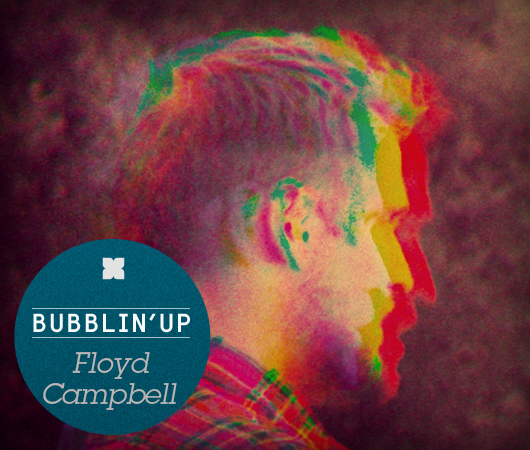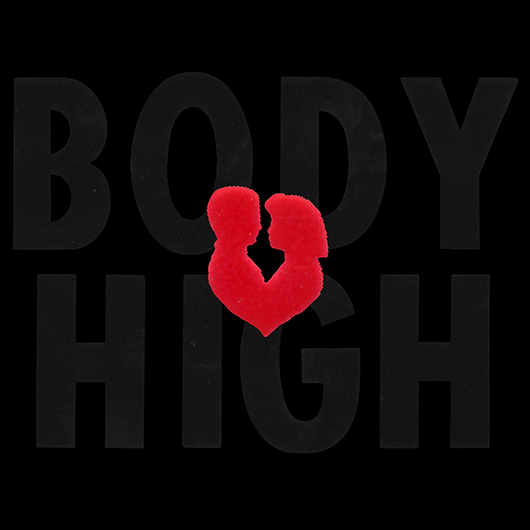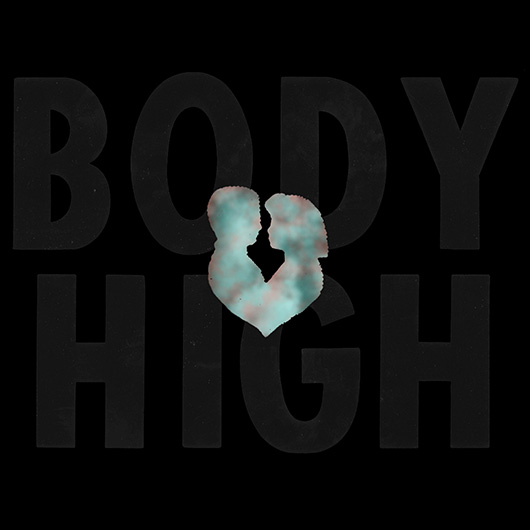Bubblin’ Up: Floyd Campbell
Like many samplers before him, Los Angeles-based producer Floyd Campbell (real name Cam Floyd) has […]

Bubblin’ Up: Floyd Campbell
Like many samplers before him, Los Angeles-based producer Floyd Campbell (real name Cam Floyd) has […]

Like many samplers before him, Los Angeles-based producer Floyd Campbell (real name Cam Floyd) has stumbled on a novel trick, simply by turning his ear towards the world around him. “I was hiking up in Malibu canyon,” he explains. “There’s an empty water tank up on the hill that’s just been rusted over, and there’s a small hole, and you can crawl inside. And it just has this crazy echo with weird natural reverb. So if you hit sticks or stones together or tap on the side…” The Angelino trails off before adding, “I got the field recorder based on that.”
Understandably, it can be hard to place the origin of the sounds he’s using—especially after he contorts them, runs them through a sampler, and subs them in for more ordinary percussive hits. In a way, Floyd’s process injects a bit of physical geography into his production, referencing the city of Los Angeles and its surrounding counties in a roundabout way. “I like how it has a connection the city or the place it’s made from,” he says. “I usually just bring the [recorder] with me. I’ve just been trying to be aware and ready in case I come across a cool situation. Pretty much it’s been fun going around the city and just finding out the noises that are out there. Other things have been streams or crickets chirping or traffic or dumpster lids.” This willingness to tap into different sound worlds also carries over into Floyd’s music in a larger sense; although he’s firmly entrenched in the new school of bass, his productions do pull liberally from the traditions of house and techno. His hybrid creations are undoubtedly hard to pin down, but it’s no stretch to say that Floyd is cooking up a futuristic strain of dance music, one composed of hyperkinetic tones that seem to distort through time and tempo.
Drifted EP

Though Floyd’s a newcomer to the public eye, his relationship with music is deeply ingrained. As a child, he gained a basic understanding of music theory via piano and guitar, something he credits with helping his current production work. “It gives you more of a perspective,” he explains. “It allows me to analyze music. I can hear a song and recognize something in it that’s common to another song—just motifs that are outside the song itself. It helps me a lot and gives me more ideas to work with.”
Electronic music wasn’t Floyd’s first love—that honor goes to the bleak and powerful sound of death metal. Throughout high school, he played in bands as a lead guitarist, swearing fealty to West Coast heavyweights Megadeth. “[They] were my favorite band of all time,” he says. “I still have a Jackson guitar I play with occasionally. But my tastes have changed a little bit.” That change was an organic process, one that came with having an open mind. While playing guitar, he also DJed with his friends and got into things like the Wu-Tang Clan, Aphex Twin, and Detroit techno. But of these, it was Richard D. James’ twisted experiments that changed the course of his musical direction. “It just sounded like alien noise,” he recalls. “I really responded to that aspect. Old Aphex Twin specifically had a lot of the things I really liked about metal—that intensity, of course, but also a focus on really crazy rhythms. Ever since, I’ve gotten everything I can get my hands on by him. He’s definitely my idol.”
Floyd’s involvement in bands also introduced him to computer multitrack recording. As his interest in electronic music deepened, moving from the live-sound-oriented Acid Pro to the beat-oriented Fruity Loops was a natural transition. He soon found himself exploring new territory, making instrumental hip-hop in the vein of RZA and, as he puts it, “joke electronic ’80s music.”
Seriousness would come when he went away to college at the Maryland Institute College of Art. Moving from North Carolina to Baltimore, he devoted himself to learning the craft of illustration, which would eventually become his primary occupation. Nevertheless, while Floyd invested himself in the visual world at school, he still had the opportunity to explore his musical vision via a new class the college offered in experimental live electronic music. He credits the class with a lot, saying, “That opened up some possibilities in terms of bringing outside instruments into the computer and working with non-synth-based stuff—using microphones, found sounds, and stuff like that. Before that, I was mostly focused on sampling from other songs, but after [taking the class], I expanded my sound palette a lot.”
Bank Walls EP

After college was over, Floyd packed his bags and headed west to Los Angeles. There, while trying to create a career for himself in illustration, he began to look around for a way to release the projects he’d made. Of his outlook at the time, he says, “My ambitions weren’t, like, ‘I want to blow up and be famous.’ I wanted to share music with a good outlet and people I respect.” That outlet turned out to be Los Angeles-based label Body High, the bass-centric imprint run by Samo Sound Boy and Jerome LOL. He says, “I was just looking online and noticed it. For some reason, [Samo] was one of the only people I emailed the demo I had—which wasn’t even a real demo, but just quick bounces of little experiments in Reason. He really responded to it and got in touch with me and we started developing stuff from there.” This resulted in his debut, the Drifted EP, an intense and prismatic release that included bangers like the stabby “Taped” and brutal “Escalate.” Bank Walls, his latest release, also just dropped on the same label.
While many producers tend to closely guard their experiments in the studio, Floyd has so far been rather generous with his followers. Ahead of each Body High EP, he teased the public with Visions and Visions2, two mixtapes filled entirely with original material. As it turns out, he’s a prolific beatmaker and a quick worker. “Most all of the stuff on the recent EP stemmed from demos that I would just come up with [a rhythm for] in a matter of 15 minutes,” he divulges. “It’s really about experimenting, but that part is easy—the hard part is fitting [the initial idea] into a whole song structure.”
Hooking up with Body High has done more than just give him a public platform—it’s also helped bring him up to speed on the desires of the dancefloor, as he’s begun to play semi-regularly at the label’s parties. He admits that the learning curve has been steep. “Every time I go to a club, I learn so much about what works and what doesn’t in that type of setting,” he says. “I have a tendency to want to add a ton of stuff to my music. It’s just tempting to fill up the entire space, but when you’re actually DJing tracks together, it’s important to leave space for the tracks to interact and work with each other. I want to be able to mix stuff in an interesting way or have [my tracks] used in an interesting way, and I think a lot of that has to do with just leaving space for other parts to enter. Mostly, my education has just been repeating that fact in my head: just take it out, don’t add anything else.”
At the same time, Floyd insists on continually pushing the boundaries of his music into new territory. “I try to intentionally do stuff that sounds different,” he explains. “If I [make] a song or something that I like, but [it] sounds like something else, I’ll just kind of throw it out and keep it as a demo. Anything that I release, I want it to sound dramatically different, [even] by my own standards.” So far, Body High has been the perfect place for that, as he says, “[The label] is all about creative freedom and has always encouraged me to go in my own direction.” Where that next direction will be is difficult to predict, but given the quality of his releases so far, it’ll be exciting to hear where he goes in the future.

